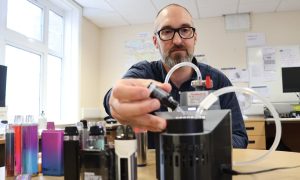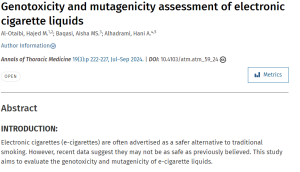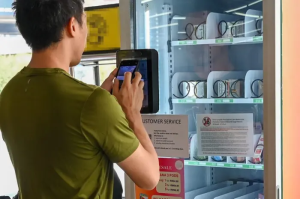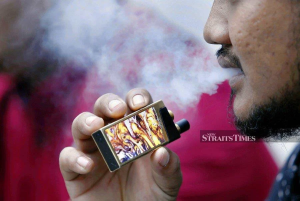Health and child rights NGOs mount a court challenge against the delisting of liquid nicotine. Their suit, unprecedented in Malaysian anti-tobacco litigation, accuses Health Minister Dr Zaliha Mustafa of harming public health and acting illegally and irrationally.
KUALA LUMPUR, July 3 – Anti-tobacco and child rights advocates have taken legal action against Health Minister Dr Zaliha Mustafa and the government for declassifying liquid nicotine as a scheduled poison.
In their filing last Friday for a judicial review at the High Court here, the Malaysian Council for Tobacco Control (MCTC) with over 40 organisations, the Malaysian Green Lung Association (MGLA), and Voice of the Children (VoC) sought a court order to quash the removal of liquid and gel nicotine from control under the Poisons Act 1952, gazetted by the health minister in an order last March 31.
Dr Zaliha told the Dewan Rakyat Special Chamber last June 12 that the exemption of liquid and gel nicotine from the Poisons List was the government’s “due process” to enable the taxation of e-cigarette and vape liquids with nicotine.
“The Minister acted illegally, irrationally, with procedural impropriety,” MCTC, MGLA, and VoC said in their statement of claim, as sighted by CodeBlue.
“Her actions were also disproportionate because the Minister, who was under a duty to protect public health, had in fact failed in that duty and instead prioritised revenue collection. In reality, the Minister’s actions harm public health, particularly children who are the most vulnerable in society.”
Ironically, in a recent separate case at the Federal Court, the Ministry of Health (MOH) successfully defended its smoking ban at eateries that was challenged by a group of smokers, after the seven smokers failed to get leave from the apex court last June 20.
Back in 2011, the High Court here sided with the MOH over the tobacco industry – on the basis of public health – in the case of Godfrey Phillips (Malaysia) Sdn Bhd v. Health deputy director-general (public health), where the tobacco wholesale distributor had sought to challenge retail selling prices for L&M cigarettes, a brand owned by Philip Morris International.
While those two lawsuits disputed the MOH’s actions in protecting public health, the unprecedented suit by anti-tobacco and child rights groups conversely accuses the Health Minister of harming public health by deregulating liquid nicotine.
This public interest case – an historic first in Malaysian public health and anti-tobacco litigation – sees the health minister and the government, specifically the MOH, in the inconceivable position of opposing health advocates in court.
While lines were clearly drawn in the past for tobacco control, the federal regulator of health is now, incredulously, on the other side – facing off the very same people that it used to partner with for years in their long-standing fight against Big Tobacco. The MOH has always disputed industry claims of “harm reduction” with vape and e-cigarettes.
MCTC, MGLA, and VoC – represented by their solicitors, Kanesalingam & Co – named the Minister of Health, Malaysia and the Government of Malaysia as the first and second respondent respectively in their lawsuit. Dr Zaliha was described as the current health minister and the minister at the material time.
The two anti-tobacco groups – MCTC and MGLA – filed suit through their respective public officers, Muhammad Sha’ani Abdullah and Ho Rhu Yann.
Civil society mounted their legal challenge after the government referred the Control of Smoking Products for Public Health Bill 2023 – which regulates tobacco and vape products – to the Health parliamentary special select committee (PSSC) last June 12 after first reading in the previous Dewan Rakyat meeting.
The government delayed passage of the bill, despite Dr Zaliha’s own admission of a “lacuna” in the law that legalised the sale of nicotine vape to minors aged below 18, following the health minister’s exemption of liquid nicotine from the Poisons List three months ago.
Never before in recent history has the government referred a government bill to a PSSC before even tabling it for second reading for debate in the full chambers of Parliament. Last Tuesday, after attending a meeting by the Health PSSC chaired by Kuala Selangor MP Dzulkefly Ahmad on the tobacco bill, Dr Zaliha claimed on Twitter that the bill would be tabled in the next parliamentary meeting.
MCTC, MGLA, and VoC, however, contended in their court filing that it was “unclear” when the Control of Smoking Products for Public Health Bill would be tabled for second reading or passed in Parliament.
Health Minister Allegedly Violated Poisons Act By Disregarding Poisons Board
Dr Zaliha – in gazetting the order last March 31 to exempt liquid and gel nicotine used in e-cigarettes and vaporisers from the Poisons List in the First Schedule to the Poisons Act – had vetoed unanimous objection from the Poisons Board to the exemption proposed by the government.
The Ministry of Finance (MOF) then imposed excise duties of 40 sen per ml on e-cigarette and vape liquids containing nicotine from last April 1.
MCTC, MGLA and VoC’s lawsuit accused Dr Zaliha of breaching the Poisons Act by overriding the Poisons Board – an independent body established under the Poisons Act to advise the Health Minister, including on the removal of poisons from the Poisons List.
The applicants contended that the health minister’s failure to consult, or adequately consult, the Poisons Board was tantamount to “no effective ‘consultation’”, as required by Section 6 of the Poisons Act. Section 6 empowers the Health Minister to amend the Poisons List “after consultation with the Poisons Board”.
“Further, the Minister did not properly consider the views and decision of the Poisons Board; and there were no plausible or rational reasons to counter the Poisons Board’s decision,” said their statement of claim.
“The stated reason for the Impugned Exemption is ultra vires the Poisons Act,” the applicants added. The “Impugned Exemption” refers to the health minister’s March 31 order exempting liquid and gel nicotine from the Poisons List.
“The ability to impose customs duties or to monetise a poisonous substance is not a permissible or rational reason to remove an otherwise poisonous substance from the list of poisons.
“Further or in the alternative, the Minister, in acting on the wishes of the Ministry of Finance and disregarding the decision of the Poisons Board, acted ultra vires the Poisons Act by failing to apply and exercise her own independent judgement, as is expected of a reasonable health minister that is responsible for health, rights and safety measures.”
According to the MOH’s Pharmaceutical Services Programme’s website, the Poisons Board comprises Health director-general Dr Muhammad Radzi Abu Hassan, as well as members from various government departments, the Malaysian Medical Council (MMC), associations representing doctors and pharmacists, and business chambers. (The previous DG in office at the time of the March 29 Poisons Board meeting on the proposed liquid nicotine exemption was Dr Noor Hisham Abdullah).
A source – who attended the March 29 Poisons Board meeting that was called in less than 24 hours – told CodeBlue previously that the Poisons Board voted unanimously against the proposed exemption of liquid nicotine from the Poisons List because it believed the declassification would cause more harm than benefit. The exemption meant legalising the sale of nicotine vape products to anyone, including underage children, amid the absence of any regulation on vape or e-cigarettes.
In their court filing, MCTC, MGLA, and VoC noted that as a Group C poison, prior to the March 31 exemption, nicotine could only be sold or supplied by registered medical practitioners, pharmacists, dentists, or vets as a medicine. (Tobacco is not classified as a poison as it is regulated instead under the Control of Tobacco Products Regulations 2004 under the Food Act 1983).
The applicants also highlighted Section 17 of the Poisons Act that explicitly protects minors aged below 18 from scheduled poisons, making it an offence to sell or supply poisons to a minor other than for purposes of medical treatment.
Liquid Nicotine Exemption Allegedly Contradicts MOH Policy Objectives
MCTC, MGLA, and VoC asserted that the exemption of liquid nicotine from the Poisons List contradicted the MOH’s own policy objectives of prohibiting tobacco products, e-cigarettes, and vape – for both children aged below 18 and anyone born from January 1, 2007 (known as the generational end game, or GEG) – as well as controlling nicotine consumption, exemplified through the Control of Smoking Products for Public Health Bill.
“The Impugned Exemption ignored the prevailing research on nicotine addiction and the harm it causes, the uncertainty about how much worse nicotine through electronic products are, and the overwhelming research that shows that children and young persons are particularly attracted to and likely to become addicted to nicotine through vapes or electronic cigarettes,” said their statement of claim.
The applicants added that the declassification of liquid nicotine effectively legalised any level of nicotine content in vape and e-cigarettes amid the lack of legislations or regulations on these products.
They said vapes with nicotine levels of between 30mg per ml (3 per cent) and 50mg per ml (5 per cent) are currently available in the Malaysian market; nicotine is toxic at 60mg per ml (6 per cent) concentration.
Countries that regulate e-cigarettes and vape – such as the United Kingdom, Australia, Indonesia, the United States, and New Zealand – limit nicotine content in these products to a maximum of 20mg per ml (2 per cent) to 30 mg per ml (3 per cent), the applicants pointed out.
Exemption Order Allegedly Unconstitutional Without Parliamentary Approval
MCTC, MGLA, and VoC claimed that the order gazetted by the health minister to remove liquid nicotine from the Poisons List, and the power to make such an order under Section 6 of the Poisons Act, was unconstitutional.
They said Article 66 of the Federal Constitution provides that the exercise of legislative power is by Parliament which shall – “(except in instances that do not apply here)” – ordinarily make laws by bills passed by both Houses of Parliament, and upon receiving royal assent.
Pursuant to Section 2(1)(b) of the Interpretation Acts of 1948 and 1967, Part I of the Interpretation Act applies to the Poisons Act, being an Act revised under the Revision of Laws Act 1968. Section 15 of the Interpretation Act provides that the Schedule to an Act shall be construed and have effect as part of the Act, the applicants contended.
“As such, the power granted by Section 6 of the Poisons Act to the Minister to amend the Schedule to the Poisons Act is ultra vires the legislative power of Parliament enshrined in Article 66 of the Federal Constitution,” said their court filing.
Liquid Nicotine Declassification Allegedly Breaches WHO FCTC and CRC
MCTC, MGLA, and VoC contended that the deregulation of liquid nicotine breached Malaysia’s international commitments, namely the World Health Organization’s (WHO) Framework Convention on Tobacco Control (FCTC) and the Convention on the Rights of the Child (CRC).
Malaysia became party to both international treaties in 2005 and 1995 respectively.
“The Impugned Exemption is contrary to Malaysia’s international commitments, and in breach of the legitimate expectation of the Applicants and the Malaysian public that the Minister would act in accordance with international norms,” said the statement of claim.
MCTC, MGLA, and VoC cited Article 5.2 of the FCTC that states member parties, in accordance with their capabilities, shall develop appropriate policies for “preventing and reducing tobacco consumption, nicotine addiction, and exposure to tobacco smoke”.
Dr Vinayak Mohan Prasad, the unit head of No Tobacco at the WHO Department of Health Promotion, told CodeBlue in an interview in Geneva, Switzerland, last May that e-cigarettes and vape must be regulated within the context of tobacco control and that all FCTC provisions applied to such products: “Article 5.2 says that you have to regulate these products, whether it’s tobacco or nicotine.”
On the CRC, the applicants cited Article 3 that states in all actions concerning children, “the best interests of the child shall be a primary consideration”.
MCTC, MGLA, and VoC also cited Article 24 that provides that parties to the CRC shall “recognise the right of children to the enjoyment of the highest attainable standard of health”, as well as to “develop preventive health care, guidance for parents and family planning education and services”.
“In the circumstances, the Impugned Exemption was made without due regard to the rights of the child, and was made contrary to the best interests of the child,” the applicants said.
“Further, there was a failure to consult children or their representatives in breach of the CRC, thus rendering the Impugned Exemption illegal or irrational.”
The anti-tobacco and child rights groups also claimed that Dr Zaliha did not provide relevant stakeholders, including the applicants themselves, “an effective right to be heard on the matter before making her decision, which deviated from all medical and health norms expected of a Health Minister even after the decision from the Poisons Board”.
Applicants Seek to Quash or Void Delisting of Liquid Nicotine, Plus Stay of Proceedings on Order
MCTC, MGLA, and VoC sought a court order to quash the health minister’s March 31 order that removed liquid and gel nicotine from the Poisons List. Alternatively, the applicants asked for a court declaration that the delisting of liquid nicotine is void.
They further sought a stay of proceedings on the order, pending the disposal of the substantive hearing of their judicial review application.
“In the circumstances, the Minister took into account irrelevant considerations and failed to take into account relevant considerations, rendering the decision to make the Order arbitrary and acted so unreasonably that no reasonable decision maker in similar circumstances would have acted in like manner,” the applicants concluded.
Hearing for the case in the High Court is scheduled for July 26 before Justice Wan Ahmad Farid Wan Salleh.
The lawsuit by anti-tobacco and child rights groups is believed to be the first public interest case filed against the unity government led by Pakatan Harapan and Barisan Nasional, seven months into Prime Minister Anwar Ibrahim’s administration.
Dr Zaliha, Malaysia’s first woman health minister, was appointed to Cabinet last December. The 59-year-old Sekijang MP is a freshman legislator from Anwar’s party, PKR.
Civil society’s legal action marks a dramatic escalation of frustrations in the medical and anti-tobacco fraternity over the declassification of liquid nicotine, heightened by the government’s failure to secure passage of the 2023 tobacco bill in the last Dewan Rakyat meeting.
VoC’s participation in the lawsuit also signals interest in vape and the delisting of liquid nicotine as a child rights or child protection issue, beyond public health.
MCTC is an umbrella body comprising more than 40 organisations that promote tobacco control, according to its website.
MCTC member organisations include associations representing health care professionals: the Malaysian Medical Association (MMA), the Malaysian Pharmacists Society (MPS), the Malaysian Nurses Association (MNA), the Malaysian Association of Medical Assistants (MAMA), the Malaysian Association of Environmental Health (MAEH), the Malaysian Public Health Physicians’ Association (PPPKAM), the Malaysian Thoracic Society (MTS), the Islamic Medical Association of Malaysia (IMAM), and i-Medik.
Members of MCTC also include public universities like Universiti Malaya (UM), Universiti Kebangsaan Malaysia (UKM), Universiti Malaysia Sabah (UMS), Universiti Pendidikan Sultan Idris (UPSI), Universiti Putra Malaysia (UPM), the National Poison Centre at Universiti Sains Malaysia (USM), and Universiti Teknologi Mara (UiTM).
Patient and consumer groups are also part of MCTC, including Lung Cancer Network Malaysia (LCNM), the National Cancer Society Malaysia (NCSM), the National Cancer Council (MAKNA), the Federation of Malaysian Consumer Associations (FOMCA), the Muslim Consumers Association of Malaysia (PPIM), the Heart Foundation of Malaysia (YJM), the Gerontological Association of Malaysia (GEM), the Malaysian Association for Maternal and Neonatal Health (MAMANEH), the Malaysian Association for the Prevention of Tuberculosis (MAPTB), the Malaysian Association for Adolescent Health (MAAH), and the Malaysian Women’s Action for Tobacco Control and Health (MyWatch).
Source: Code Blue










